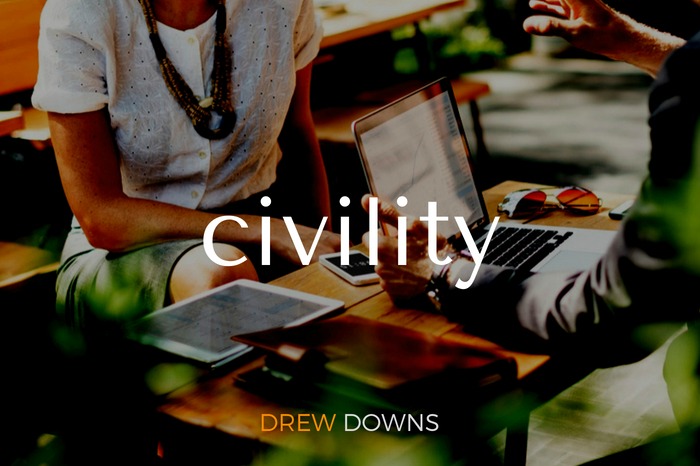When a fresh outrage comes, we sharpen knives and loosen vocal cords for the usual conversation around civility, asking as always “why can’t we just get along?” as if this were the whole problem. It isn’t.
There’s a lot of talk about civility right now. Whether it’s a conversation on Facebook or serving a public official in a restaurant. We all seem to be talking about the way we treat each other.
But the talk about the way we talk to each other is too vague to be helpful. Because it can always be true. This is the catch-22 of community: opposing vague truisms can be true at the same time.
The paradox proves both truths true. But never at the same time.
We need more civility.
and
We need to speak up, even when our voice shakes.
Our vague platitudes about the forever truths of the moment need to be tested to know how true they are for that moment.
So if the real problem of our moment is civility, then we really need to work at policing that. Let’s not mistake, however, the ways policing civility are used to silence minorities from the comfort of privilege. Or that the buck ought to stop at the top of the system.
Nor should we stray too far from the racist colonial concept of civilizing others and its continued evolution to civility. Like the impulse to defend slavery morphed into Jim Crow, the impulse to “civilize the savage” has morphed into the policing of civility we saw throughout the ‘50s and ‘60s during the civil rights movement. And today?
So the problem is not really just about getting along. We can write any number of think pieces about the need for civility and taking the high road without ever dealing with what’s true.
Deeper Truth
What separates a straight baker who refuses to bake a cake for a gay couple from a manager who asks a press secretary to leave a restaurant is power. Not just in the moment, but in the world.
It isn’t just the thing, but the thing’s context. It’s never just a cake or fried pickles or a “sincerely held belief” or civility.
The cake baker appealed to the authority of his religious tradition, then the court system (which had set a new precedent) to keep him from serving a minority couple. A couple who have less political power.
The restaurant owner, confronted by the anxiety of minority employees asked a powerful person to leave on behalf of her people. In fact, it sounds like the interaction was actually pretty civil.
While the two may seem similar on the surface, they reveal a much greater truth when digging deeper. In one, a person with power wants to exercise it over one with less. In the other, a person with less seeks to use the power she has to protest a person with the full power of the White House.
But that doesn’t contain everything, either.
Because these two are very different cases of civility.
Behind these two cases are, in the one, a gay couple longing to be respected, and in the other, children being ripped from their families in cruel immigration policies. To talk only about civility robs us of the underlying motivation.
This isn’t just civility.
The question shouldn’t be about endorsing actions or demanding civility; we can all agree and feel good about ourselves for being upstanding human beings who would never stand for abuse or incivility. In the abstract sense, we can all say that’s exactly what we’re doing.
But all it takes is a look around to see we’re just deluding ourselves.
This isn’t just civility. Like it isn’t just partisanship, a culture war, or politics as usual.
Even the question of “what kind of person do I want to be?” can open our minds to the broader truth.
The question isn’t about being civil. There’s much more to it than that.
Do we love? Are we fair? Do we invite each other into conversation?
According to the owner of the Red Hen:
“I explained that the restaurant has certain standards that I feel it has to uphold, such as honesty, and compassion, and cooperation.”
She actually sounds pretty civil. And it sounds like the start of a conversation.
To get a little meta we can pan out on this whole conversation around civility itself. What has the civility conversation brought? Is it helping? Has it brought more civility? Or is there something deeper?
What do you think?

